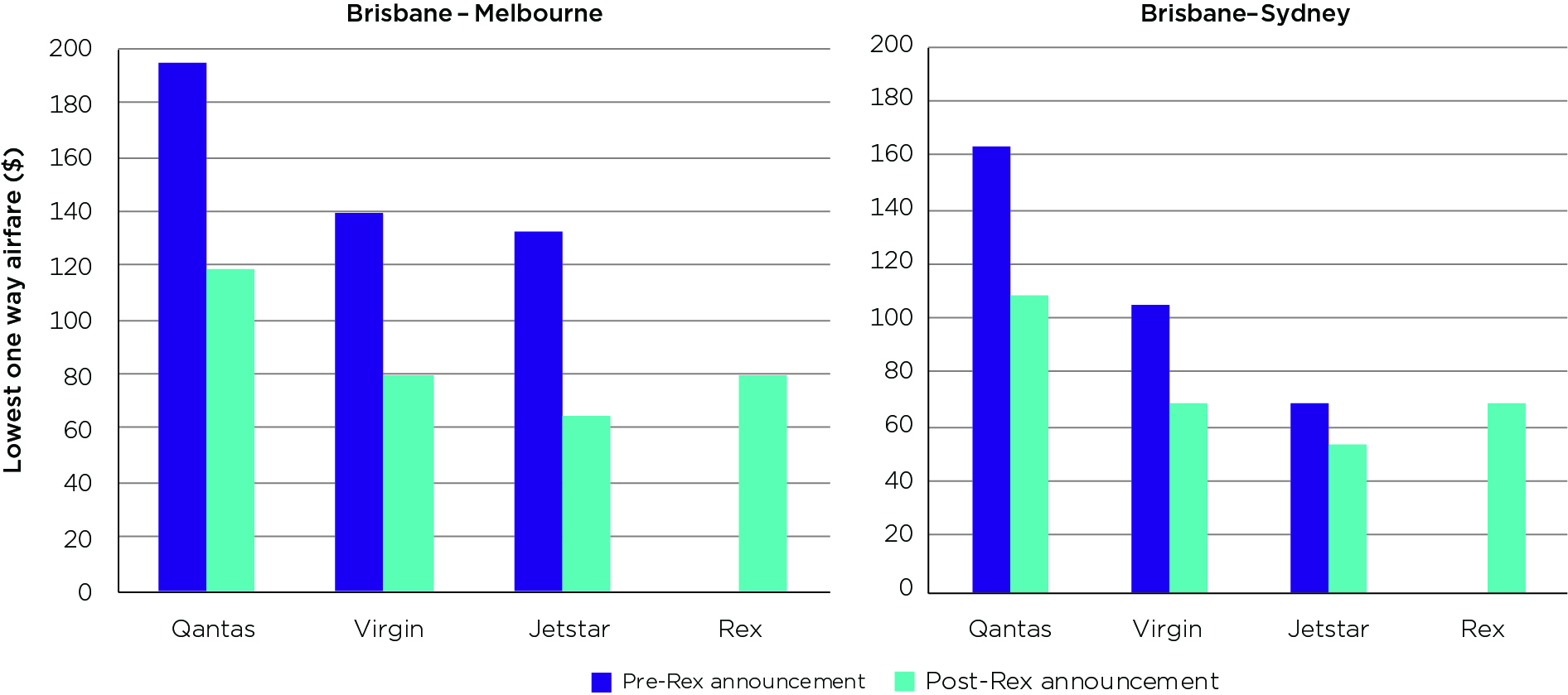Millions of Australians are set to benefit from increased competition and cheaper airfares on Australia's busiest routes as state and territory borders reopen and the domestic airline industry prepares for a peak summer period, the ACCC's latest Airline Competition in Australia report reveals.
The report, released today, shows that greater optimism among Australians that state and territory borders will remain open has been driving renewed confidence to fly, and a choice of four airlines on the country's busiest routes appears to be putting downward pressure on airfares.
Rex recently announced it would add Brisbane to its intercity network by mid-December, which means it will be operating on Australia's top five busiest routes connecting Sydney, Melbourne, Brisbane, Adelaide and the Gold Coast. These routes carried over 22 million passengers per year pre-COVID-19, which is over one-third of all Australian domestic passengers annually.
"Rex's further expansion is welcome news for the millions of travellers who will soon have a choice of Qantas, Jetstar, Virgin or Rex on Australia's five busiest routes," ACCC Chair Rod Sims said.
Following Rex's announcements, Virgin, Jetstar and Qantas all reduced their cheapest available fares on certain flights early in the new year. On Brisbane-Sydney, Virgin matched Rex's $69 fare and Jetstar undercut Rex with sale fares at $55. Similarly, on Brisbane-Melbourne, Virgin matched Rex at $79 and Jetstar undercut Rex with sale fares at $65. Qantas also lowered its airfares on both prospective routes.
"We have already seen some significant reductions in airfares as a result of the increasing competition on major intercity routes, and we expect there will be further downward pressure on prices as the airlines compete for passengers," Mr Sims said.
The report says that new low-cost leisure airline Bonza's announcement that it will commence services from next year is another significant development for domestic airline competition. Backed by a US private investment firm, Bonza intends to fill a niche in the market by targeting unserved and underserved routes to regional centres, and plans to launch direct flights to destinations that currently require transit through a major city.
"Bonza's announced entry as a new and independent low-cost carrier will no doubt be welcomed by regional communities," Mr Sims said.
"As Bonza announces its network, we will be alert to any anti-competitive capacity increases or pricing practices by the other airlines in response to the new competition."
Virgin, Qantas and Jetstar have also announced several new connections on routes that have never been served, or not served for some time. Virgin recently launched services on Launceston-Perth and Launceston-the Gold Coast, Jetstar will fly Mackay-Sydney from late December, and from March 2022 Qantas will fly Newcastle-Adelaide and Wagga Wagga-Brisbane.
"With Bonza's network plans, and Virgin, Jetstar and Qantas launching new direct regional links, consumers will benefit from greater choice, route connectivity and cheaper airfares," Mr Sims said.
As states and territories achieved their vaccination targets and borders began reopening, airlines reported significant increases in ticket purchases and many consumers were confident to book their tickets more than two months in advance.
"COVID-19 has had a dramatic impact on the airline industry but there were positive signs that it was starting to recover as people booked long-awaited holidays," Mr Sims said.
"The airline industry will continue to face operational challenges from COVID-19, including the new variant Omicron and its potential impact on people's ability and confidence to travel."
Before booking any travel, consumers should carefully review the airline's terms and conditions of purchase to understand if they are entitled to a refund or some other remedy in the event of a cancellation due to COVID-19 travel restrictions. Consumers should also consider the costs and benefits of purchasing more flexible fares, which may be more expensive, versus purchasing discounted but more restricted fares.
"In the event new government travel restrictions are introduced, whether or not someone is entitled to a refund or credit voucher will depend on the airline's specific policies and practices," Mr Sims said.
The report also looks at the profitability of the Australian airlines and shows that the Qantas Group, Virgin and Rex collectively lost in excess of $4 billion over the past 10 years.
While this result primarily reflects the impact of COVID-19 in recent years, regular losses incurred by Virgin meant that the industry as a whole was losing money before the pandemic struck. Qantas and Rex were profitable in the years before the COVID-19 pandemic.
Qantas and Virgin have benefitted from consistent positive earnings of their domestic operations and customer loyalty programs, while performance of their international business operations has been mixed.
Indicative changes in selected airfares on Brisbane-Melbourne and Brisbane-Sydney routes following Rex's announced entry

Note: Prices observed from the airlines' websites on 9 November 2021 (pre-Rex announcement) and 19 November 2021 (post-Rex announcement) for travel on 6 January 2022.
Background
On 19 June 2020, the ACCC was directed by the Treasurer, The Hon Josh Frydenberg MP to monitor the prices, costs and profits of Australia's domestic airline industry and provide quarterly reports to inform Government policy. The direction is for three years. This report is the sixth under the Treasurer's direction.






